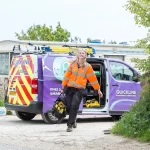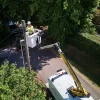B4RN Secure Finance from Triodos Bank UK to Expand Rural 10Gbps Broadband

Broadband ISP B4RN (Broadband for the Rural North), which is a community built and supported network that has so far deployed their 10Gbps full fibre (FTTP) lines to cover 30,000 rural premises in England, has announced that they’ve secured new finance from Triodos Bank UK to help expand their network into the North East of England.
The provider, which is a registered Community Benefit Society (i.e. they can’t be bought by a commercial operator and profits go back into the community) and home to over 15,000 customers (target to reach over 20,000 in the next 5 years), has already expanded their full fibre network to cover various remote rural parts of Lancashire, Cheshire, Cumbria, Northumberland, Essex, Norfolk, Suffolk, Yorkshire, Northumberland and County Durham – often with the direct help of local volunteers (building and shares).
The venerable alternative network is currently working to try and expand the reach of their network outside the North West and deeper into the North East of England, specifically focusing on areas around the Northumberland and County Durham border (e.g. Hexhamshire, West, Humshaugh, Kielder Forest, Kirkwhelpington, Simonburn, Slaley & Healey, Tarset & Falstone, Wall & Sandhow, Warden, Weardale and Woodburn).
Advertisement
However, such an expansion will require extra investment, which is where the new agreement with Triodos Bank UK should come in handy. In 2019, the bank’s corporate finance team structured and raised a £3.3m bond for B4RN, which helped the organisation scale its network and connect thousands of rural homes and businesses. This was often used to underpin their applications to the government’s Gigabit Broadband Voucher Scheme.
Dinkar Suri, Senior Manager at Triodos Bank UK, said:
“B4RN exemplifies the kind of high-impact, community-led organisation we are proud to support. Its work not only bridges the digital divide but also strengthens rural economies and social cohesion. This new facility reflects our confidence in their model and our shared commitment to inclusive, sustainable development that helps people thrive.”
Tom Rigg, CEO of B4RN, said:
“Triodos has been a trusted partner since our 2019 bond raise, and the bank’s continued support is instrumental in helping us reach more communities. With this new funding, we can accelerate our rollout in the North East and ensure that even the most remote areas have access to world-class digital infrastructure.”
Unfortunately, the announcement doesn’t include any details of the new finance facility, which makes it a bit hard to judge the likely impact. The organisation’s latest annual accounts, which run to the end of March 2025, showed that they had a total of 80 employees, turnover of £4.8m (up 11%) and assets worth £33.67m.
The operator also generated Earnings Before Interest, Taxation, Depreciation and Amortisation (EBITDA) of £2.08m (2024: £1.76m) and received £1.8m in Government grants. Last year they invested £5.29m into building their network and its associated technology (2024: £5.71m).
The financial year to which this report relates also saw the launch of their partnership with Nokia as suppliers for the deployment of XGS-PON (10-Gigabit Symmetric Passive Optical Network) technology on their networks, with the first project going online in January 2025.
Advertisement
Mark is a professional technology writer, IT consultant and computer engineer from Dorset (England), he also founded ISPreview in 1999 and enjoys analysing the latest telecoms and broadband developments. Find me on X (Twitter), Mastodon, Facebook, BlueSky, Threads.net and Linkedin.
« Openreach Raises Prices on Copper Lines to Boost UK Fibre Broadband Adoption






















































Great to see B4RN doing well. I wish there were more B4RNs and less BTs.
B4RN are wonderful but Openreach build out equivalent coverage every 3 days.
This is both true and impressive. Sadly, for commercial reasons or otherwise, Openreach wouldn’t build to some rural areas. So the communities concerned built their own network from scratch. A non-trivial task but the result works very well and continues to do so.
So B4RN and the other B4RNs out there like Broadband for the Surrey Hills, Broadband for Rural Nottinghamshire (and several others) continue to quietly deliver affordable, high quality services where they are wanted using cost effective methods and with the help of the communities themselves.
More power to them.
@Winston Smith not in deeply rural areas, they don’t. And they are far, far, far more fiancial-capital intensive in what they do.
You’ve managed an apples and lamb comparison, there.
My reply was to the OP wishing away BT/O’s 20+ million FTTP coverage. B4RN themselves have said their approach doesn’t scale.
Surely ‘fewer’?
With the blistering rollout speed of tens of thousands of premises in 14 years, cutting edge deployment strategies that rely on farmers digging trenches across their own fields, and with the glorious choice of one (1) ISP.
Easy to see why no one else has copied the model.
Also amusing to see them using XGSPON – wasn’t one of B4RN’s previous talking points about the alleged superiority and flexibility of point to point fibre?
B4RN’s model has been copied, either partly or in whole, by a number of other small community focused altnets. All of which I believe are still active.
It was because nobody was about to build FTTP to them anytime soon that the people in B4RN land (and other rural areas) decided to do it themselves.
The coverage area is now vast in the deep rural and all gigabit symmetrical for £33pm.
It worked out pretty well I thought.
So what’s your point exactly, other than being mean-sprited ?
A community come together and build something that both delivered and has been studied and emulated worldwide and that’s your take?
That is an insanely mean-spirited post. They delivered full fibre where previously there was nothing and no plans. Whether they did it through narrow trenching, mole boring or a donkey dragging a plough through a field it’s done.
The smarmy remark about a single ISP is quite bemusing. They are hardly going to build out a full API-based ordering platform and automated provisioning and do not have scale.
There’s a lot to be said for projects like this that JFDI. A comment like that makes me think of the similar acronym GFY.
B4RN’s achievement is awesome. More power to them ensuring that even remote areas that would be in the last 1% aren’t out of reach.
Concerning that the new financing by Triodos is trumpeted but the numbers are not disclosed. The business may be worthy but it may well be kept afloat by government BDUK hand outs and ponzi style share issues.